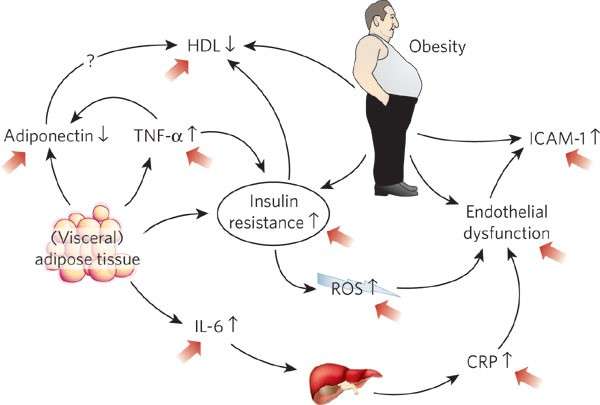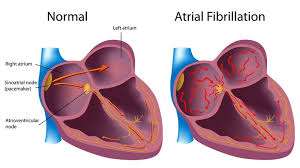Obesity is no longer just a cosmetic concern—it is a full-blown health crisis.
Beyond making it harder to squeeze into your favorite jeans, obesity carries a heavy toll on your cardiovascular health.
This article dives deep into the hows and whys of this relationship, exploring the science behind obesity and cardiovascular disease.
LeanAndFit will discuss:
- How obesity affects the heart and blood vessels.
- Why BMI matters in cardiovascular health.
- The connection between obesity and coronary artery disease.
- Real-life examples to bring the science home.
- FAQs on Obesity & Cardiovascular Health
- Proven solutions to combat this health challenge.
By the end, you will understand why those extra pounds can lead to serious heart issues and what you can do to protect yourself.
Let’s get straight to the point:
How Obesity Impacts Your Cardiovascular System?
The connection between obesity and cardiovascular disease is as clear as day.
Excess weight is not just hard on your joints—it also places a heavy burden on your heart and blood vessels. Let’s break down the mechanisms:
1. Increased Blood Pressure
Carrying extra weight often leads to hypertension, a major contributor to cardiovascular disease caused by obesity.
Fat tissue requires more oxygen and nutrients, which forces the heart to pump harder.
This increased workload also narrows blood vessels, raising blood pressure.
Scientific Backing:
A study published in Hypertension Journal (2019) found that individuals with higher BMIs had a significantly increased likelihood of developing high blood pressure, a critical precursor to heart disease.
2. Dyslipidemia: An Imbalance of Fats in the Blood
Obesity disrupts the body’s lipid profile, raising LDL (“bad cholesterol”) and lowering HDL (“good cholesterol”).
This imbalance accelerates the buildup of arterial plaque, leading to conditions like coronary artery disease obesity.
Real-Life Example:
Sarah, a 45-year-old nurse, struggled with weight gain due to her demanding job.
Routine blood tests revealed elevated LDL and triglycerides.
Her doctor explained how these imbalances increased her risk of atherosclerosis, a condition that narrows arteries and can lead to heart attacks.
3. Diabetes as a Gateway to Heart Disease
Obesity is a primary driver of insulin resistance, paving the way for type 2 diabetes.
Diabetes, in turn, doubles the risk of cardiovascular disease related to obesity.
The Science:
According to the Journal of the American Heart Association (2020), individuals with diabetes and obesity have a twofold higher risk of heart disease compared to those with a healthier weight.
These three factors combined show how obesity sets the stage for cardiovascular complications, making prevention and management crucial.

The Role of BMI and Fat Distribution
Body Mass Index (BMI) is a widely used indicator to assess the risk of overweight and cardiovascular disease.
While a BMI above 30 signifies obesity, even those in the overweight range (BMI 25–29.9) face elevated heart risks.
1. A Closer Look:
A comprehensive meta-analysis published in The Lancet (2021) revealed a striking finding: for every 5-unit increase in BMI, the risk of developing coronary heart disease rose by 27%.
This means that even moderate weight gain can have significant repercussions for heart health.
2. Visceral Fat: The Hidden Culprit
Not all fat is created equal. Visceral fat, which wraps around internal organs, poses a greater danger than subcutaneous fat (the type just beneath the skin).
This “hidden fat” is metabolically active, releasing inflammatory markers like cytokines and hormones that worsen cardiovascular health.
Scientific Insight:
Research published in the Circulation Journal (2018) confirmed that visceral fat is a stronger predictor of cardiovascular obesity than subcutaneous fat.
It contributes directly to atherosclerosis (plaque buildup in arteries) and hypertension by promoting chronic inflammation and insulin resistance.
Key Takeaway:
Both BMI and visceral fat offer valuable insights into cardiovascular risks.
While BMI provides a broad measure, the distribution of fat—particularly the accumulation of visceral fat—adds a critical layer to understanding obesity’s impact on heart health.
Addressing both metrics is vital for reducing cardiovascular complications.
Obesity and Specific Cardiovascular Conditions
Let me walk you through some of these conditions in brief:
1. Coronary Artery Disease
Plaque buildup in the arteries due to obesity leads to narrowed vessels, restricting blood flow to the heart. This is the essence of coronary artery disease obesity.
Case Study:
John, a 52-year-old salesman, ignored his growing waistline until he experienced chest pain during a morning jog.
His doctor diagnosed him with coronary artery disease, exacerbated by years of being overweight.
2. Heart Failure
Carrying extra weight overworks the heart, leading to conditions like heart failure.
The heart struggles to pump effectively, causing fluid retention and breathlessness.
3. Atrial Fibrillation
Obesity increases the risk of irregular heart rhythms, particularly atrial fibrillation (AFib).
AFib is a significant contributor to strokes and heart failure.
Long-Term Consequences of Obesity on Cardiovascular Health
Ignoring the impact of obesity is not just about accepting a few extra pounds—it is about risking your heart, your energy, and even your life expectancy.
The long-term effects of cardiovascular disease caused by obesity can be profound and far-reaching.
1. Higher Risk of Stroke
Obesity often leads to atherosclerosis, where plaque builds up in the arteries.
This narrows blood flow and increases the chances of blood clots, making strokes more likely. For individuals with overweight and heart disease, this risk is compounded.
2. Chronic Fatigue
When your heart struggles to pump blood efficiently due to the strain of cardiovascular obesity, your body does not receive the oxygen it needs.
This results in persistent fatigue, reduced productivity, and a lower quality of life.
3. Reduced Lifespan
The toll on life expectancy is stark. A study published in BMJ (2019) found that individuals with obesity lived approximately 10 years less than their leaner counterparts.
Cardiovascular complications, including coronary artery disease and strokes, were among the primary contributors to this shortened lifespan.
The Bottom Line
The long-term consequences of obesity on cardiovascular health are too serious to ignore.
From strokes to decreased energy and a reduced lifespan, the stakes are high.
Taking proactive steps to address obesity is essential to protecting not just your heart, but your future.
Why Weight Management is Key?
Here is why:
1. Healthy Eating for a Healthy Heart
Reducing calorie intake and focusing on heart-friendly foods can significantly improve cardiovascular health. Think whole grains, lean proteins, and healthy fats.
Practical Example:
Sarah swapped her processed snacks for nuts and fruits, reducing her LDL cholesterol levels within six months.
2. Regular Exercise
Physical activity burns calories and strengthens the heart. Aim for 150 minutes of moderate-intensity exercise per week.
Pro Tip:
Combine aerobic exercises like walking or swimming with strength training for the best results.
3. Medical Interventions
In some cases, lifestyle changes are not enough. Medications or procedures like bariatric surgery can help mitigate risks associated with cardiovascular disease from obesity.
Real-Life Inspiration: Maria’s Story
Maria, a 40-year-old teacher, struggled with her weight for years, often brushing off warnings about her health.
A wake-up call came during a routine checkup when her doctor flagged her cholesterol and blood pressure levels as dangerously high.
Determined to make a change, Maria embraced a heart-healthy diet, began walking daily, and joined a community weight-loss group.
Over 18 months, she lost 60 pounds.
Not only did her cardiovascular health improve, but she also felt more energetic and confident.
FAQs on Obesity & Cardiovascular Health
Q-1: How does excess body fat push arteries toward disease, even before cholesterol looks “bad”?
A-1: Visceral fat releases inflammatory signals and free fatty acids that injure the endothelium (the vessel’s inner lining). That impairment reduces nitric oxide (needed for dilation) and makes arteries stickier, so LDL particles—especially the small, dense types—are more likely to lodge and oxidize. You can see this early as higher resting blood pressure, lower flow-mediated dilation, or a rising apoB despite a near-normal LDL-C.
Q-2: Why does obesity raise blood pressure independent of salt intake?
A-2: Several systems turn up the pressure: insulin resistance increases renal sodium reabsorption, visceral fat amplifies sympathetic nervous activity, and adipose tissue activates the renin–angiotensin–aldosterone system. Together they expand blood volume and tighten vessels. A telltale pattern is elevated nighttime blood pressure (blunted “dip”) and morning surges—both linked to higher cardiovascular risk.
Q-3: What’s the connection between obesity and heart failure with preserved ejection fraction (HFpEF)?
A-3: Extra mass increases blood volume and cardiac filling pressures. Low-grade inflammation stiffens the heart muscle and the vasculature, while sleep-disordered breathing and hypertension add load. The result is breathlessness with a normal ejection fraction. Early clues: rising resting heart rate, ankle swelling after long days, and disproportionate shortness of breath on stairs despite normal echo pump function.
Q-4: How does obesity disrupt “healthy” cholesterol patterns—even when HDL is high?
A-4: Triglyceride-rich particles flood the system, leading to cholesterol exchange that lowers HDL quality and creates smaller, denser LDL. Waist-to-height ratio >0.5 often predicts this remnant-rich state. Labs may show triglycerides creeping above ~150 mg/dL, HDL that looks okay but functions poorly, and non-HDL cholesterol or apoB elevated—stronger signals of atherosclerotic risk than LDL-C alone.
Q-5: Can weight loss measurably reverse cardiovascular risk—and what improves first?
A-5: Yes, and the changes are sequence-specific. Within weeks, endothelial function and blood pressure improve; within months, triglycerides drop, HDL function perks up, liver fat falls, and insulin sensitivity rebounds. Cardiac structure takes longer: left ventricular mass and atrial size may regress over months to a year.
The biggest risk reductions come from combining modest weight loss (5–10%), higher cardiorespiratory fitness (e.g., 150–300 minutes/week moderate activity plus 2 resistance sessions), and attention to sleep and blood pressure. Even without large weight changes, improving fitness and waist-to-height ratio meaningfully lowers event risk.
Takeaway: Obesity strains the cardiovascular system via endothelial injury, hormonal pressure systems, adverse lipoprotein remodeling, and volume overload. Track the right markers (waist-to-height ratio, blood pressure patterns, triglycerides, non-HDL/apoB) and target reversible levers—weight, fitness, sleep, and BP—to move risk in the right direction quickly.
Scientific Studies That Support These Findings
The connection between obesity and cardiovascular health isn’t just speculation—it is backed by robust scientific research:
1. “Obesity and Cardiovascular Disease” (Circulation, 2021):
This comprehensive study outlines how obesity contributes to heart failure, coronary artery disease, and hypertension. It emphasizes the systemic strain excess weight places on the cardiovascular system, leading to reduced cardiac efficiency and increased risks of complications.
2. “Visceral Fat and Cardiovascular Health” (The Lancet, 2020):
Focusing on the dangers of visceral fat, this research highlights how fat stored around internal organs releases inflammatory markers that exacerbate arterial damage and increase the risk of stroke and heart disease.
3. “BMI as a Predictor of Heart Disease” (European Heart Journal, 2019):
This study demonstrates a direct correlation between higher BMI and increased cardiovascular risks, urging targeted prevention strategies to mitigate the growing burden of obesity-related heart diseases.
Key Takeaway:
These studies underscore the undeniable link between obesity and cardiovascular conditions, stressing the importance of proactive measures for prevention and improved health outcomes.

Take Action Today
Obesity’s impact on cardiovascular health is profound, but it’s not irreversible.
By addressing factors like diet, exercise, and medical interventions, you can reduce the risks of cardiovascular disease related to obesity.
Your heart is a resilient organ, capable of bouncing back when given the chance.
Start small—swap unhealthy snacks for fruits, take the stairs instead of the elevator, or join a fitness class.
Over time, these changes will add up, giving you a healthier heart and a brighter future.
Remember, every heartbeat counts. Make yours a strong one.
References: